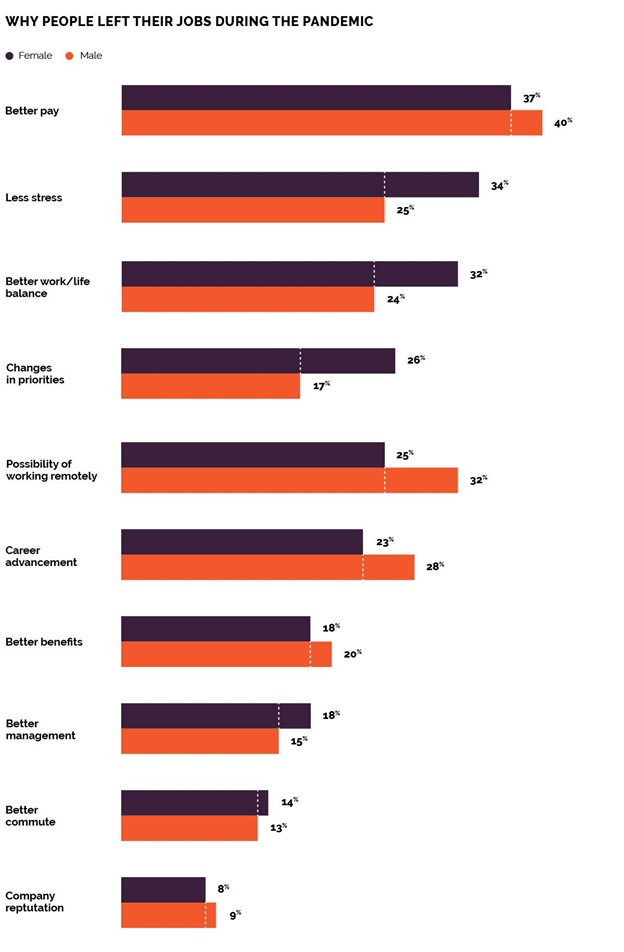Sign up for SmartBrief on Leadership today for free.
The news is rife with reports on the Great Resignation. According to the U.S. Bureau of Labor Statistics, in November, the “quit rate” rose to 3%, with more than 4.5 million people voluntarily leaving their jobs. Employers are struggling with a challenging labor supply shortage as people seek out new opportunities.
But this shift is deeper than employees jumping to new jobs; it is also about people re-evaluating their priorities and purpose. I propose that the Great Resignation is actually a symptom of a greater sea change: the Great Re-Evaluation. To be successful in this new age of work, employers should focus on three key areas:
- Reimagining the office
- Revisiting company values
- Getting onboarding right
We used DISQO’s consumer insights platform, which gives brands a complete understanding of what people think and do, to develop insights into why people are quitting or switching jobs at such high levels today.
In October 2021, DISQO asked 39,477 US adults about their attitudes on remote work and priorities. We learned that people are looking for more flexibility, whether it’s how they work or where they work. While better pay was still the most popular reason for leaving a job, the possibility of remote work, less stress and better work-life balance were also important motivating factors.

Remote work is here to stay
When work shifted to remote for many employers in the spring of 2020, companies initially thought their teams would be back in-person in mere weeks — at the most, a few months. In recent months, some have made moves to “get back to normal,” but those efforts are ignoring the reality that today’s normal doesn’t look like yesterday’s.
Our insights showed that only 27% of those employed thought that employers should require workers to come back into the office if remote work was possible.
While we’ve realized many benefits in the new remote world, there have been challenges we’ve all faced, including the lack of in-person connections. The reality is that they offer real value, including planned and spontaneous collaboration, learning by watching and the ability to enhance professional relationships.
However, rushing back to the good old days of 100% in-person working to solve these challenges would be a mistake. Employee expectations have changed. If employers put in the work to find the middle ground, they will be better positioned to retain current and attract new team members.
Reimagine “the office”
Only 26% of the people we surveyed in October 2021 said they worked remotely before the pandemic, whereas 41% said they were working remotely at the time our study was fielded. This is a 58% increase in the number of people working remotely, a year and a half after the pandemic started.

The pandemic has taught us that team members can be productive when they work from home, but that they also want opportunities to meet in person. At DISQO, we’ve taken an approach that we call “flexibility and choice.” By re-envisioning “the office,” we have the opportunity to keep what works and get rid of what doesn’t in today’s world.
Where the office was once a place to go, sit down and get work done, in the post-pandemic world, it should be more about personal connections and collaboration. Our office spaces should better enable team interactions, and our technology stacks should better enable online collaboration. This creates a hybrid solution that accommodates both our remote and in-person needs.
If today’s talent is in the midst of redefining their values, then employers need to follow suit. Now is the time for employers to take a look at their values and ask whether they align with what people need. This shouldn’t be a question posed to just the leadership team, but one the entire organization should rally to answer. By working across functions and through experience levels, organizations can shape a new value system that resonates with the entire workforce.
DISQO’s values were created in this way, starting with a companywide survey and refinement by a cross-functional team. Our values were embraced because the people were included in the process, and they are reinforced through regular performance appraisals and frequent celebrations of those who best exemplify them.
Finally, with the work and investment that goes into attracting new talent, it is important to get onboarding right — it must not be underestimated. Employers should ensure that new team members feel welcomed, connected and included and that they are creating value. Today’s new, flexible work environment can make onboarding even more challenging, and so managers need to be methodical with their approach.
For DISQO, this has meant developing an onboarding process, agnostic of experience level and location. We take a servant leadership approach, where our people leaders create customized 30/60/90-day onboarding plans that specify goals and activities with a clear path to achievement. We also provide bite-sized DISQO-essential information, engaging events and access to learning opportunities. Onboarding occurs over many weeks, enabling new joiners to digest the amount of content over time.
The rate of change we’ve all undergone since early 2020 is not likely to be something experienced again in our lifetimes. The good news is that the rapidly forced changes have led to new learnings and growth in areas that may have otherwise taken us a decade to achieve. If we embrace those learnings now, today’s Great Re-Evaluation can fuel tomorrow’s growth.
Tiffany Chelsvig is vice president, people operations, at DISQO. Passionate about revolutionizing employee experience, she is an expert in turning culture into competitive advantage. With more than 20 years of experience in strategic HR management and operations, including roles at Green Dot, Rubicon Project, Velocify and ZipRecruiter, her work with disruptive technology companies across multiple verticals has resulted in three initial public offerings and multiple acquisitions.
When Chelsvig’s not thinking about helping companies and employees to be their best selves, she spends time with her family paddle boarding, exploring, reading, running and experimenting with plant-based eating.
If you liked this article and video, sign up for SmartBrief’s free email newsletter on leadership. It’s among SmartBrief’s more than 250 industry-focused newsletters.
